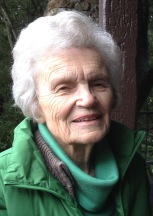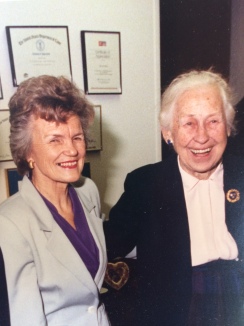Advocate for Tradeswomen
Prescript–Madeline’s obit was published in the New York Times: https://www.nytimes.com/interactive/2018/magazine/the-lives-they-loved-2018/stories/madeline-mixer?mtrref=www.google.com&gwh=DA3173ABC9CA1D356B48F73B38783B2A&gwt=pay
My dear friend Madeline Mixer has died.
As the director of the Women’s Bureau District IX of the U.S. Department of Labor, and long after her retirement, Madeline was a friend to tradeswomen and women who sought jobs in nontraditional blue-collar work.
Madeline was an avowed feminist and for a time during the Reagan administration she lost her job because of it. Feminism ran in the family. She told me her mother, who lived to be 101, had been a suffragist and organized to get women the vote.
I think Madeline’s life goal was to make it possible for women to have access to jobs that could make them independent of men. Her own life experience as a divorced mother of a young child was the driving force behind her feminism. At the time women didn’t have so many options.
I met Madeline in the 1970s soon after I moved to San Francisco. As an activist trying to break barriers to women in the construction trades, I was pointed to Madeline’s office in the old federal building. There I found her in a small room with one secretary as staff. The Women’s Bureau (established in 1920) has been virtually defunded by recent Republican administrations, but even then funding was shallow.
Long before tradeswomen had an office or a staff, Madeline allowed us to use a conference room in her building for meetings on Saturdays. Fifty women might show up and we’d host a wide-ranging discussion that often focused on sexual harassment (we called it gender harassment then; there were no laws prohibiting it) and isolation on the job. We tackled the issues of race and class, strategizing how to build an organization and a movement.
Madeline understood the importance of communicating as a way to to support each other and organize. We had the idea of a newsletter for tradeswomen, something that could connect us and help women find jobs in the trades. We began publishing Trade Trax newsletter out of Madeline’s office. It was a monthly two-page tract that volunteers mimeographed, folded and mailed. We charged $1 to get on our mailing list and a couple hundred women paid their buck.
In 1980, while Jimmy Carter was still president, Madeline called me with the news that some big mucky muck from the Department of Labor was coming to town. She asked me to put together a proposal to fund a newsletter or magazine. We were granted about $5000 and Tradeswomen Magazinewas born. The grant didn’t pay for staff, only printing and mailing, and tradeswomen volunteers wrote it, then typed it into columns and pasted it up one Saturday every three months. We published it for nearly two decades. It was the principal way tradeswomen communicated with each other around the country and the world during the 80s and 90s.
Later, after she retired, Madeline funded, out of her own pocket, the newsletter Pride and a Paycheck, edited by Sue Doro, which is still being published.
In 1979, Madeline, along with Susie Suafai and other advocates, founded the nonprofit organization Tradeswomen Inc., still going today. It was Madeline who first thought of the term tradeswoman.

I know there were many other projects Madeline championed, but she always kept us in her sights. When Tradeswomen Inc. foundered for lack of funding, as often happened, Madeline could always be counted on to slip us enough money to pay our staff person or to help us find grant funding to keep us afloat.
Madeline was an inspiration to us all partly because she never turned her back. In the early 70s she grabbed on to the issue of women in construction and didn’t let it go for half a century. Class tensions arose between tradeswomen and our advocates. We were a fiercely independent tribe and many of us didn’t trust government officials or academics or lawyers, even the ones clearly on our side. Not everyone appreciated the federal government and its representatives. But Madeline hung in there with us.
Our association was long and fruitful. We appreciated Madeline and we honored her frequently. At one event I introduced her as having witnessed more of my relationships and breakups than my own mother had. Madeline never lost her sense of humor. She reminded me that she was much younger than my mother. But, of course, she could have been my mother. We were about 20 years apart in age.
Madeline also roped her husband Joe into helping tradeswomen. He was an experienced grant writer and participated in many long fundraising meetings with us. Joe died in January after a short illness.
Madeline Mixer, never a tradeswoman herself, was arguably the most important brick in the house tradeswomen built. Her legacy of advocacy highlights the importance of collaboration. She never stopped believing in us.






Thanks Molly for the wonderful summary of her feminism in action. Priscilla
Sent by Priscilla’s Cat
>
LikeLiked by 1 person
So sorry for your (and our) loss. She will be greatly missed. What a legacy!
LikeLiked by 1 person
She couldn’t possibly have been a better advocate for us. Thanks for the article, Molly. Know anything about a memorial?
LikeLiked by 1 person
I was active in childcare in the 60’s as a teen parent and was recruited by the SF Model Cities Agency in 1971 as Childcare Program Specialist to implement childcare. The Mission Childcare Consortium established 7 centers in 3 years and one of or the first “battered child” program in the Country. We need help from the feds and Madeline was always helpful and so many ways. California has a rich history in childcare after WWII and still does. There was massive expansion in the 70’s and the Women’s Bureau at Dept. of Labor was so important with Madeline at the helm.
LikeLiked by 1 person
Great herstory Lynne! Thank you.
LikeLiked by 1 person
Thank you, Molly. Madeline was an incredible icon to us all.
LikeLiked by 1 person
Dear Molly, Thank you for a wonderful memoir/elegy of Madeline Mixer. What a dear friend she must have been to you and all the others she defended and represented throughout her illustrious and inspiring life. My thoughts are with you. All love, Yvonne
LikeLiked by 1 person
Thanks Molly. I will never forget Madeline and your recollections put some of her contributions in perspective. She was also a neighbor of mine and I’ll miss running into her and Joe around town. Please let me know if there’ll be a memorial. Meri
LikeLiked by 1 person
Hi Molly
I had not heard of Madeline Mixer’s passing. She was one of those great bureaucrats that moved tradeswomen forward for many years. Thanks for writing this.
LikeLiked by 1 person
Thanks Molly for the wonderful tribute. Madeline was a wonderful friend of the tradeswomen movement and will be missed.
LikeLiked by 1 person